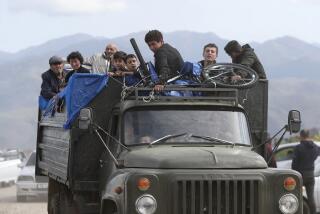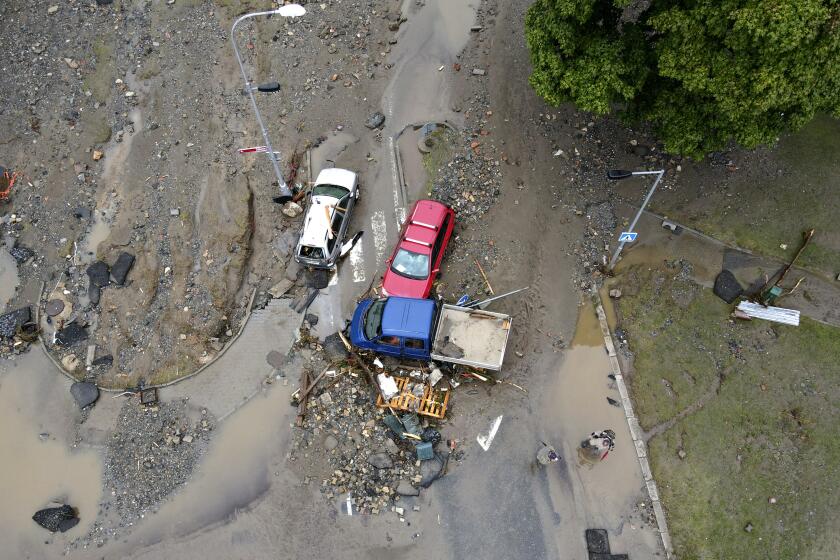German Election Appears Headed to a Photo Finish
A grainy image of a vampire with sharp, rippling fingers appeared on the front page of a newspaper the other day, evoking the angst Germans are carrying into Sunday’s election.
Nosferatu, the iconic bloodsucker from the 1922 silent film, was meant to symbolize Paul Kirchhof, the man conservatives would put in the Finance Ministry to enact a flat tax criticized by liberals as a windfall for the rich at the expense of laborers and the middle class.
This is a nation that has lost faith in government after a decade of broken promises. The German desire to excel has been drained by globalization pressures and the inability to overhaul a welfare state, which have contributed to anemic economic growth and an 11.6% unemployment rate.
The contest between Chancellor Gerhard Schroeder of the Social Democratic Party and his Christian Democratic Union challenger, Angela Merkel, has intensified in recent days.
A poll by German television found the race had narrowed considerably, with the conservative alliance receiving 48% to 51% of the vote and the Social Democrats and leftist parties attracting 45% to 49%.
But the prevailing zeitgeist is gloom, perhaps because those uneasy with Schroeder fear even grimmer times loom behind Merkel and her flat-tax platform.
Recent polls suggest that 25% of voters are undecided and that 26% believe the government can fix what has gone badly wrong.
“I really don’t know what to do,” said Thomas Simon, a Berlin travel agent. “I’m dissatisfied with Schroeder, but I have no hope a new government will be any different. I feel alone. This is especially painful for me because I know how important elections are, but still I don’t know who to vote for on Sunday.”
Further uncertainty appears likely. Until two weeks ago, Merkel and her conservative coalition were expected to win more than 50% of the vote and control the government.
Schroeder’s attacks on Merkel’s economic proposals, however, have revived his Social Democratic coalition’s chances. The chancellor is considered too weak to land a third term, yet his party coalition may win enough votes to force a “grand coalition” with the conservatives.
Most politicians believe such an outcome would lead to a stalemate between leftists and conservatives. That is what forced Schroeder in May to call early elections, after his own party was torn over paring social programs that take up nearly two-thirds of the nation’s $233 billion in annual tax revenue.
Conservative attempts at harsher cuts would face fierce opposition and doom a grand coalition, many analysts say. “A grand coalition would be poison,” the nation’s largest newspaper, the tabloid Bild, declared Friday.
The Frankfurter Rundschau noted, with a touch of sarcasm: “Everything is going to be better. The only question is how?”
The acrimony between left and right was evident recently in dueling campaign statements from Schroeder and Merkel. Hammering the conservatives’ flat-tax proposal, Schroeder said, “It is completely unfair that a bus driver will pay as much as a millionaire.” Merkel responded that Schroeder was pandering to “polemic unworthy of a chancellor.”
Such sniping has led to captivating, if despairing, political theater for many Germans seeking inspiration at rain-soaked campaign rallies. They have come away with the stark realization that this election may redefine their relationship with the social democracy that emerged after World War II.
“I’m 54 years old and I’m not hopeful,” said Ralf Haertwig, a businessman. “I don’t see any solutions. I think about it all the time, but I have none. I don’t like the choices we have on Sunday. The conservatives are better for my wallet, but my heart is more leftist. But no one seems to have the answers.”
Germans are searching for a voice they say has yet to emerge from the cacophony of political parties. Schroeder, with his cigar and tailored suits, is affable and well-liked. His administration is credited with helping restore Germany’s sense of identity from the stigma of World War II. He began moderate changes in social and labor programs, but after seven years in office, he has failed to reinvigorate Europe’s largest economy.
Merkel, who would be the nation’s first female chancellor, is determined and intelligent, but some say she lacks charisma and often appears aloof. Corporations favor her, but the lower and middle classes fear her plans would put too much pressure on them. Neither she nor Schroeder, according to polls, have the bearing to strengthen the reunification of the country that began after the end of communism.
“The spirit is lacking,” Simon, the travel agent, said. “We need a politician or a party to speak to the people. We need someone who is courageous enough to push through the reforms and put the country back on track.”
More to Read
Sign up for Essential California
The most important California stories and recommendations in your inbox every morning.
You may occasionally receive promotional content from the Los Angeles Times.











